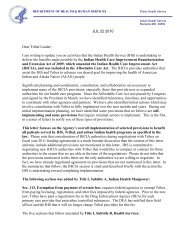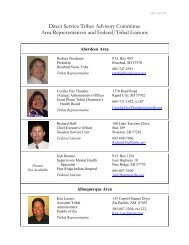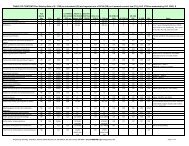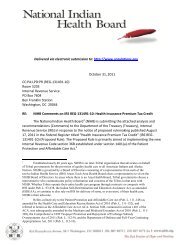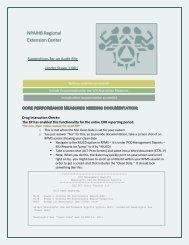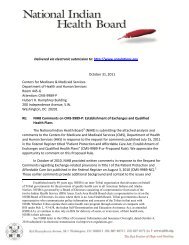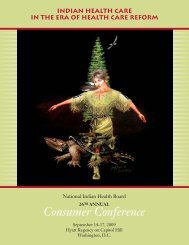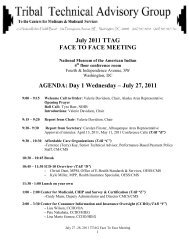mmpc - National Indian Health Board
mmpc - National Indian Health Board
mmpc - National Indian Health Board
You also want an ePaper? Increase the reach of your titles
YUMPU automatically turns print PDFs into web optimized ePapers that Google loves.
2. Office of Intergovernmental Affairs (IGA): IGA is responsible for Department-wide<br />
implementation and monitoring of EO 13175 for HHS Tribal consultation. IGA serves as the<br />
Department’s point of contact in accessing department-wide information. The single point<br />
of contact within the IGA for <strong>Indian</strong> Tribes and other Tribal/<strong>Indian</strong> organizations, at a level<br />
with access to all HHS Divisions, is the Principal Advisor for Tribal Affairs. As a part of the<br />
IOS, IGA’s mission is to facilitate communication regarding HHS initiatives as they relate to<br />
Tribal, State, and local governments. IGA is the Departmental liaison to States and <strong>Indian</strong><br />
Tribes, and serves the dual role of representing the States and Tribal perspective in the<br />
Federal policymaking process, as well as, clarifying the Federal perspective to States and<br />
<strong>Indian</strong> Tribes, including Tribal consultation.<br />
3. Assistant Secretary for Finance and Resources (ASFR): ASFR is the lead office for<br />
budget consultation for the overall departmental budget request.<br />
4. HHS Divisions: The Department has numerous Staff Divisions and Operating Divisions<br />
under its purview. Each of the these Divisions share in the Department-wide responsibility<br />
to coordinate, communicate and consult with <strong>Indian</strong> Tribes on issues that affect these<br />
governments. All Operating Divisions shall establish a Tribal consultation policy to comply<br />
with the HHS Policy. All Divisions are responsible for conducting Tribal consultation to the<br />
extent practicable and permitted by law on policies that have Tribal implications.<br />
5. Intradepartmental Council on Native American Affairs(ICNAA): The ICNAA is<br />
charged with: (1) develop and promote an HHS policy to provide greater access and<br />
quality services for AI/AN/NAs throughout the Department; (2) promote implementation of<br />
HHS policy and Division plans on consultation with <strong>Indian</strong> Tribes in accordance with<br />
statutes and EOs; (3) promote an effective, meaningful AI/AN/NA policy to improve health<br />
and human services for AI/AN/NAs; (4) develop a comprehensive Departmental strategy<br />
that promotes self-sufficiency and self-determination for all <strong>Indian</strong> Tribes and AI/AN/NA<br />
people; (5) promote the Tribal/Federal Government-to-government relationship on an<br />
HHS-wide basis in accordance with EO 13175; and (6) operate in accordance with policy<br />
and timeframes identified within ICNAA charter and as directed by the Secretary and the<br />
ICNAA Executive Leadership.<br />
6. Regional Offices: The ten (10) HHS Regional Offices share in the Department-wide<br />
responsibility to consult, coordinate and communicate with <strong>Indian</strong> Tribes on issues that<br />
affect <strong>Indian</strong> Tribes and HHS programs, services and resources available to <strong>Indian</strong> Tribes<br />
through States. The Regional Directors are the Secretary’s immediate representatives in<br />
the field for the HHS. Each of the Regional Office(s) shall conduct an annual regional Tribal<br />
consultation meeting with <strong>Indian</strong> Tribes in their respective regions. Additional meetings<br />
may be conducted if requested by the Regional Director or an <strong>Indian</strong> Tribe(s) within the<br />
Region. Further, the Regional Directors will work closely with the respective <strong>Indian</strong> Tribes<br />
and State Governments to assure continuous coordination and communication between<br />
Tribes and States. The Regional Office Directors will promote and comply with this policy<br />
and its timeframes identified in Section 9.<br />
8. TRIBAL CONSULTATION PROCESS<br />
An effective consultation between HHS and <strong>Indian</strong> Tribes requires trust between all parties which<br />
is an indispensable element in establishing a good consultative relationship. The degree and<br />
extent of consultation will depend on the identified critical event. A critical event may be<br />
identified by HHS and/or an <strong>Indian</strong> Tribe(s). Upon identification of an event significantly affecting<br />
one or more <strong>Indian</strong> Tribe(s), HHS will initiate consultation regarding the event. In order to<br />
initiate and conduct consultation, the following serves as a guideline to be utilized by HHS and<br />
<strong>Indian</strong> Tribes:<br />
0. Identify the Critical Event: Complexity, implications, time constraints, and issue(s)<br />
(including policy, funding/budget development, programs, services, functions and<br />
activities).



